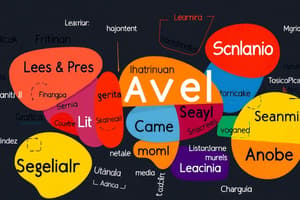Podcast
Questions and Answers
Which term best describes a planned excursion to explore new areas?
Which term best describes a planned excursion to explore new areas?
- Period
- Native
- Voyage (correct)
- Fee
What is a common synonym for the word 'sight' as used in the context of travel?
What is a common synonym for the word 'sight' as used in the context of travel?
- Fare
- Area
- Line
- View (correct)
Which word indicates the opposite meaning of 'lose' in the context of travel?
Which word indicates the opposite meaning of 'lose' in the context of travel?
- Keep (correct)
- Book
- Go
- Take
Which term is associated with the idea of reaching a destination after a journey?
Which term is associated with the idea of reaching a destination after a journey?
Which word represents a boundary or limit, often relevant in geographical contexts?
Which word represents a boundary or limit, often relevant in geographical contexts?
Flashcards are hidden until you start studying
Study Notes
Travel Vocabulary
- Voyage: A long journey, typically by sea; often associated with exploration or adventure.
- Journey: An act of traveling from one place to another; can be a long or short distance and emphasizes the experience.
- Trip: A journey to a specific destination, often temporary; may or may not include travel for leisure or work.
- Excursion: A short journey or trip, especially for pleasure; often involves a group and a planned itinerary.
Geographic Context
- View: The visual perspective of a landscape or scene; can influence travel experiences.
- Sight: Specific places of interest or landmarks that travelers aim to visit; important in tourism.
- World: Refers to the planet in its entirety; encompasses various cultures, ecosystems, and geographic diversity.
- Earth: The third planet from the sun; home to diverse climates and populations.
Travel Terminology
- Area: A distinct space or region; can be urban or rural, affecting travel plans.
- Territory: A specific geographic region; may refer to political borders or cultural spaces.
Seasonal Travel
- Season: Divided into different times of the year; seasons can dictate travel patterns and activities.
- Period: A length of time during which travel occurs; includes historical contexts or personal schedules.
Travel Costs
- Fare: The cost incurred for transportation; varies by mode (air, bus, train).
- Ticket: A document confirming the purchase of fare; often includes details on travel arrangements.
- Fee: Additional cost for services beyond basic travel charges, such as baggage or itinerary changes.
Travel Actions
- Miss: To fail to reach a destination on time, often resulting in lost opportunities.
- Lose: To no longer have something, which may include personal items while traveling.
- Take: To receive or obtain; in travel, refers to embarking on an adventure or journey.
- Bring: To carry something along during travel; relates to packing and preparation.
- Go: To move or travel; the fundamental action of embarking on any journey.
- Book: To reserve arrangements for travel in advance; critical for securing accommodations and transportation.
- Keep: To retain or maintain; refers to holding onto plans or items during travel.
- Arrive: To reach a destination; marks the end of a journey and is often a significant moment.
- Reach: To attain or get to a particular place; highlight of successful travel.
Residence and Borders
- Live: To have a permanent home; context in travel often relates to local culture engagement.
- Stay: Temporary residence in a location; linked to accommodations during traveling.
- Border: A defined line separating distinct areas; important in discussions of international travel and laws.
- Edge: The boundary or outskirts of an area; relevant when navigating new territories.
- Line: Refers to boundaries or paths of travel; can indicate borders or routes.
- Length: Measurement of distance traveled; crucial for planning itineraries.
- Distance: The space between two points; affects travel time and planning.
Guidance in Travel
- Guide: A person providing assistance or information during travel; essential for enriching the experience.
- Lead: To direct a group or an individual through a journey; involves ensuring safety and navigation.
- Native: Refers to local inhabitants of an area; offers insights into culture and customs of the place visited.
- Home: A place of permanent residency; can contrast with travel experiences and feelings of comfort or nostalgia.
Studying That Suits You
Use AI to generate personalized quizzes and flashcards to suit your learning preferences.




